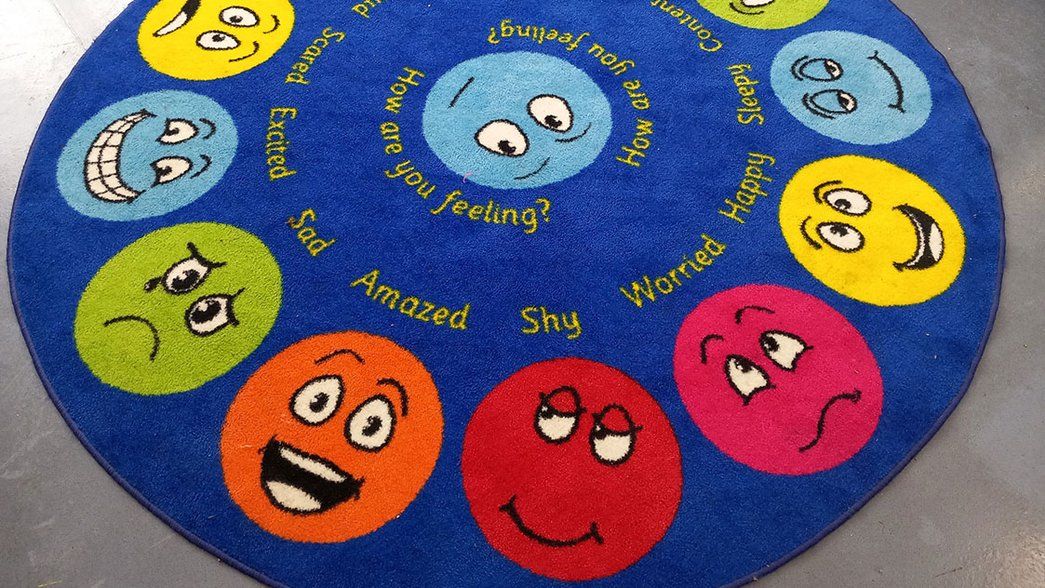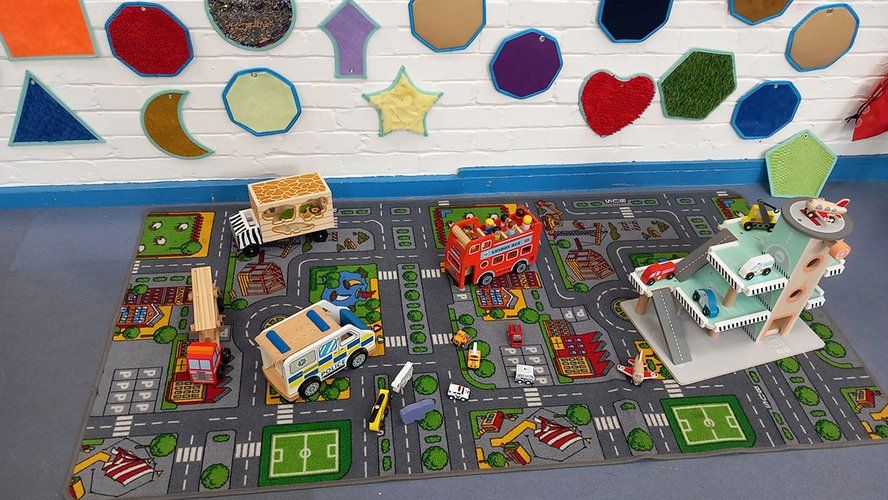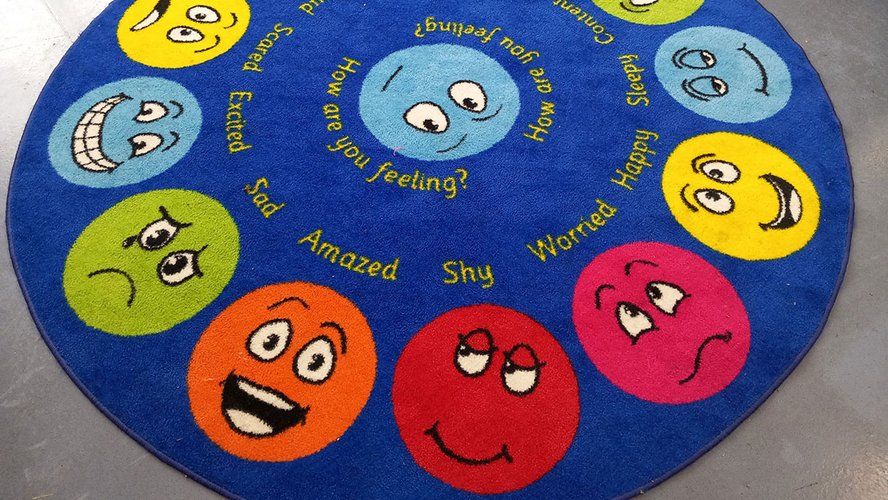The Arsenal Foundation has helped to fund a Nurture Room at Drayton Park School inspired by Arsenal in the Community’s Sensory Room at Emirates Stadium. A space like this is an invaluable resource for helping children who are dealing with emotional distress, but it is only as good as the people who run it – and the school has two specialist staff members on hand to support pupils and, by extension, fellow teachers.
Carol Howe is Behaviour and Play HLTA, and her job is to provide social, emotional and mental health support for pupils.
“We have a behaviour system where pupils earn marbles and win treats,” she says. “We have a behaviour system where pupils earn marbles. We have a twice-weekly marble treat and at the end of each term we have a big treat for pupils in each class who have earned the most marbles. The pupils love it! We’ve also been to the cinema, bowling, indoor crazy golf and the autumn term favourite, ice skating on an outside rink.”
“I work closely with class teachers to implement plans to support pupils with complex needs and trauma,” she adds. “I believe building a good relationship with pupils is vital, giving them time to talk and to truly listen to what they say and help to find solutions to difficult situations.”
Also on hand is Kim Fletcher, HLTA for Special Educational Needs children. “This role includes targeted interventions that cannot be carried out within the classroom setting, working with teachers and liaising with outside agencies to help children who need extra support,” she says.
The Nurture Room was a natural progression for the school. “Sometimes children need their own quiet and safe space – this might be to talk, to be listened to or sometimes even to get angry in,” says Carol. “It started as a small space, but the need for it grew and eventually we were able to dedicate an old classroom to it. It became the Nurture Room, now much loved by many children and an absolute necessity for a few.
“We have slowly been developing it to provide more sensory support to children when they feel they need to calm down – we brought a group of children to the Arsenal Sensory Room, which gave us so many ideas. We were never going to be able to afford what Arsenal have but it was a start to look for sensory resources we could afford.”

Soft play is a valuable tool for children who need to let off steam outside of the classroom
Stress release
Carol and Kim took that inspiration to plan the room and draft their application to The Arsenal Foundation’s Gunners Fund – and the result was a well-equipped space that brings a combination of fun, joy and calm to children in need of stress release.
“Our bubble light tube with fish is a favourite with some of our pupils, who are mesmerised by the colour changes and movement of the fish and bubbles,” says Kim. “Seeing the soft-play house at Arsenal influenced us into buying a smaller version. This is great for relaxing and as an outlet to calm down. The hammock is very popular with all pupils, and we bought lots of multi-sensory items too: musical instruments, different textured material shapes, floor tiles with different textures, and some creative play resources, like a small shop, pram, dolls, animals… and much more.”
“The money from The Arsenal Foundation covered most of the costs for all our new resources,” Carol adds. “Without that support we wouldn’t have had the money to buy these resources and enrich and support the needs of our pupils – the room is used throughout the day every day.
The room is timetabled for pupils with significant needs to use it and provides a learning break area for pupils who need it. “They can play games – Uno is currently the favourite – and use resources that they feel help them, for example Play-Doh and kinetic sand,” Carol adds. “It’s a safe space for pupils to calm down and is used to help pupils with conflict resolution. Lessons and learning are adapted to each individual as needed.”
School can be a challenging environment for some children, and that also has repercussions for teachers and classmates, but Carol and Kim have been able to use the Nurture Room to provide an adapted school day for a couple of pupils who had very complex needs.
“One pupil had been diagnosed quite late in their primary education with Autism and ADHD,” says Kim. “Their mental health and anxiety had really escalated and they were finding it so stressful to even come to school. We were able to provide a safe environment for them. They started slightly later than the rest of the school and we were able to support them in the nurture room using sensory activities, using maths and science in a more creative way, cooking and doing experiments.
“There had been points when we were unclear if the resources and adaptation were working and if we could get them to the end of the school year. But we did. The pupil had begun to slowly interact with peers again in the playgrounds and their time at school slowly increased. They had made it to the end of the school year.”

Playing with sand is one of the many resources Drayton Park School offers children in its Nurture Room – a safe space for children who are having a hard time to talk, play and resolve conflicts
Carol has also worked closely with one specific pupil who she feels has made tremendous progress: “Being in class with peers was extremely difficult and being able to keep themselves regulated was very challenging. The school day was adapted again, with time in class but then time in the Nurture Room. I worked closely with this pupil.
“Most afternoons were science-based, where the pupil managed to do hands on experiments. This really helped the pupil stay regulated. They also did some design and technology with our premises manager, making a bird house, picture frame and money box.”
Making a difference
The school is grateful for Arsenal in the Community’s inspiration and The Arsenal Foundation’s support. “I think it is so important that Arsenal helps projects like ours. With money available for schools reduced it would be impossible to be able to provide a resource like this. Football is not all bad. It unites so many people young and old from near and far. The great things like this need to be advertised more.”
There are two sides to this story, however, because we too should be grateful for the work of teachers and specialist staff to help children struggling with school – people who have dedicated their working lives to making a difference.
Kim, for example, has been at Drayton Park School for 15 years. “I’d always wanted to work in a school, even from a very young age. I started here working one to one with a child with a medical need and then moved on to working with children with Special Educational Needs.”
Carol’s story goes back even further. “I was managing a shoe shop on Holloway Road when I took a break from work to raise my two children. It was when my youngest began school – the school I’m working in now – that I volunteered to help out. I loved it – seeing children grow and succeed in their learning. Then a job opportunity arose to work with a pupil with global learning delay. That was more than 24 years ago, and I’m still here!
“I’ve had different roles in Drayton Park, from intervention groups to working throughout all year groups as a class-based Teaching Assistant. I’ve always been drawn to supporting pupils who find expressing or managing themselves difficult. I feel I was very lucky in my primary schooling and always felt safe and heard, and that is what I want for our pupils. So I work hard to empower our pupils to voice how they feel and talk through events and actions. It’s great to see pupils begin to learn and understand themselves.”
Long may that continue.
For more information on the school visit draytonpark.org.uk
Copyright 2025 The Arsenal Football Club Limited. Permission to use quotations from this article is granted subject to appropriate credit being given to www.arsenal.com as the source.






